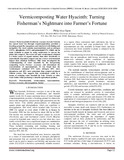Vermicomposting Water Hyacinth:
Abstract
Water hyacinth (Eichhornia crassipes) in Lake Victoria
has caused water loss through evapotranspiration, provided a
breeding ground for mosquitoes and interfered with fishing and
navigation. The weed contains macronutrients such as nitrogen
(2.5%), phosphorus (1.0%) and potassium(5.3%) which can be
made available to plants by using earthworms to convert the
plants into compost. The worm cast and vermicompost obtained
is a better source of organic manure than other aerobically or
anaerobically degraded compost and has a lower environmental
impact than chemical fertilizers. This study investigated the
vermicomposting of water hyacinth by the fast-growing
composting worm Perionyx excavatus and determined the
concentrations of macronutrients. It was found that the
vermicompost contained 47% more nitrogen, 60% more
phosphorus and 40% more potassium than compost produced
without worms. This suggests that vermiculture could be a
means of reducing water hyacinth in Lake Victoria or other
water bodies while producing a valuable agricultural product.
Collections
- Journal Articles [411]

